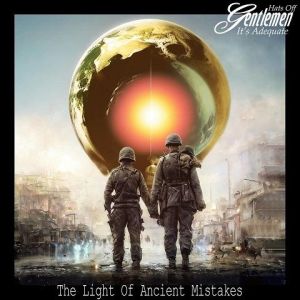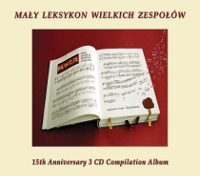HOGIA are back with their seventh album, with many of the songs this time inspired by books. The duo of Malcolm Galloway (vocals, lead guitar, keyboards, synths, programming, percussion, drums) and Mark Gatland (bass guitar, slide guitars, keyboards, synths, Chapman Stick, backing vocals, percussion, drums) have again been joined by flautist Kathryn Thomas for three tracks. I have heard quite a lot of Malcolm’s material over the years, both with his more classical head on and with HOGIA, and what has taken me with this album is not only the sheer diversity of material on offer but the depth, as this an incredibly complex album which still refuses to sit solely within what many people consider to be prog, with far more indie sounds and styles. The full version, which includes radio cuts of some numbers, is more than 80 minutes in length, containing 19 songs, but never feels over long or dragging as one is brought deeply into their world.
The instrumental “Avrana Kern Is Made Of Ants” just belts along and is quite at odds with much of the rest of the album, which goes between space rock and indie, experimental prog and psychedelia, always ensuring the listener needs to pay close attention to what is going on. The centrepiece of the album is ‘Walking To Aldebaran’, inspired by the science fiction novella of the same name by Adrian Tchaikovsky, moving from prog metal (I love the flute during the introduction where Kathryn almost loses control) to more theatrical elements. Malcolm’s vocal style really works well with this over-the-top styling, as he brings something of a David Byrne approach to it. The song is sung from the perspective of an astronaut losing his sanity as he wanders an alien labyrinth, gradually being transformed into a monster, and there is a darkness and menace here, with the strange experimental piano providing a harshness which fits well. One of my favourite science fiction writers growing up was Philip K Dick, and “The Man Who Japed” has its title taken from the novel of the same name, but not every book is science fiction, although that is a common thread.
There are plenty of instrumentals, all working with strong direction which can change with no notice whatsoever as Malcolm and Mark are never keen to rest for too long. The result is a modern progressive album which never feels regressive but is always moving forward in ways which can be quite unexpected yet always melodic and fascinating. This will not be for those who want their music of today to sound as if it were released 50 years ago, but if you enjoy a more modern approach then this is one of HOGIA’s most interesting and complete albums yet.








